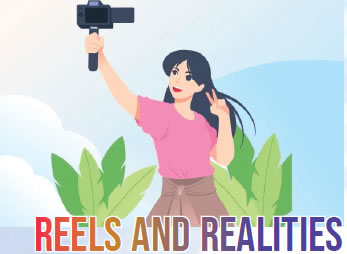Over the past few years, short videos—colloquially referred to as “reels” on websites such as Instagram, TikTok, and YouTube Shorts—have gained massive popularity as a primary source of entertainment. Bite-sized videos, usually under one minute in duration, are tailored to grab attention in no time and sustain it. Although they provide entertainment and artistic expression, reels also have some psychological impacts to think about.
Dopamine-Driven Engagement: Reels are designed to activate rapid hits of dopamine, the brain’s “pleasure” neurotransmitter. With every swipe, there is something different—amusing clips, motivating stories, or image trends—which makes the brain hungry for more. This is a potential feedback loop that can result in compulsive scrolling and addiction.
Decreased Attention Span: Prolonged exposure to high-speed content will weaken attention and decrease the brain’s capacity for dealing with longer or more complex tasks. Viewers and readers will find it harder to focus on reading, learning, or even watching feature-length videos or movies.
Distorted Reality and Self-Image: Most reels sell utopian lives, body ideals, or accomplishments, typically through filters and staged content. Sustained exposure to such images can trigger unhealthy comparisons, lower self-esteem, and even symptoms of anxiety or depression.
Emotional Rollercoaster: Since reels frequently shift between humor, glamour, drama, and inspiration rapidly, they expose the viewer to sudden changes in emotions. This can render people emotionally drained or disconnected from actual experiences.
Creativity and Connection: On the other hand, reels may foster creativity, provide comic relief, and create a sense of connection through shared trends and narratives. When viewed responsibly, they may be a source of learning and cross-cultural exchange.
Reels are a mighty force in the digital space, but their psychological influence is a double-edged sword. Consciousness and mindful use are essential to ensuring that they do good instead of bad for mental health. Using time limits, managing your feed, and putting them on pause can help keep your digital life well-balanced.


